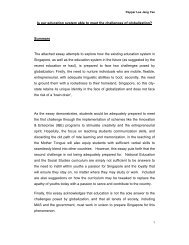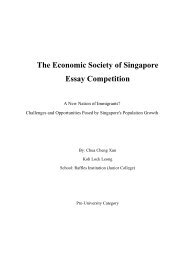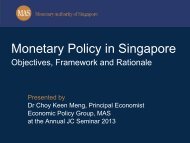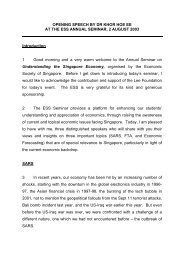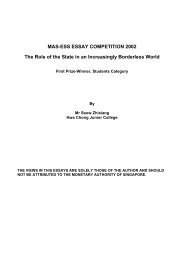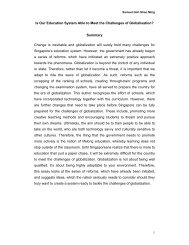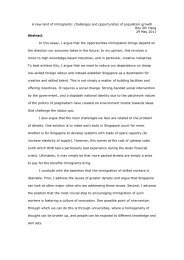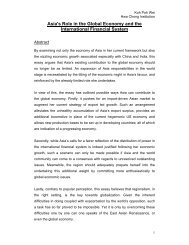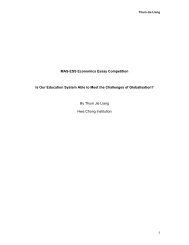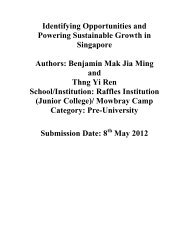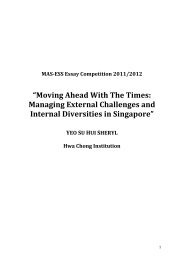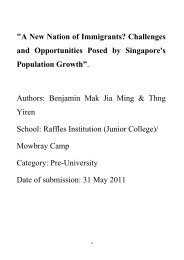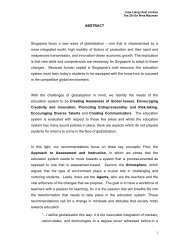the role of the state in an increasingly borderless world - Economic ...
the role of the state in an increasingly borderless world - Economic ...
the role of the state in an increasingly borderless world - Economic ...
- No tags were found...
Create successful ePaper yourself
Turn your PDF publications into a flip-book with our unique Google optimized e-Paper software.
States may allow for a more accommodat<strong>in</strong>g policy <strong>of</strong> dual citizenship. This c<strong>an</strong> susta<strong>in</strong><br />
<strong>the</strong> bonds between a country <strong>an</strong>d her diaspora, <strong>an</strong>d enables migr<strong>an</strong>ts to feel equally attached to<br />
both <strong>the</strong>ir country <strong>of</strong> orig<strong>in</strong> <strong>an</strong>d <strong>the</strong>ir adopted home. Steps may also be taken so that nationals<br />
work<strong>in</strong>g overseas ma<strong>in</strong>ta<strong>in</strong> l<strong>in</strong>ks with <strong>the</strong>ir mo<strong>the</strong>r country. Embassies <strong>an</strong>d consulates c<strong>an</strong><br />
facilitate <strong>the</strong> sett<strong>in</strong>g up <strong>of</strong> clubs to foster greater <strong>in</strong>teraction among <strong>the</strong> expatriate community<br />
<strong>an</strong>d <strong>the</strong>ir relatives back home. The build<strong>in</strong>g <strong>of</strong> schools overseas allows expatriate children to be<br />
educated <strong>in</strong> l<strong>in</strong>e with <strong>the</strong> domestic education system. S<strong>in</strong>gapore has <strong>an</strong> org<strong>an</strong>isation known as<br />
<strong>the</strong> S<strong>in</strong>gapore International Foundation, which through its vast network <strong>of</strong> publications <strong>an</strong>d<br />
activities, enable overseas S<strong>in</strong>gapore<strong>an</strong>s to rema<strong>in</strong> <strong>in</strong>formed about domestic developments.<br />
Fur<strong>the</strong>rmore, <strong>state</strong>s should provide opportunities for overseas citizens to return home <strong>an</strong>d work,<br />
so as to prevent a bra<strong>in</strong>-dra<strong>in</strong> <strong>of</strong> talent overseas. Specialists <strong>an</strong>d pr<strong>of</strong>essionals, <strong>in</strong> particular,<br />
br<strong>in</strong>g back from abroad precious experiences <strong>an</strong>d skills when <strong>the</strong>y return to take up jobs <strong>in</strong> <strong>the</strong>ir<br />
home country.<br />
V) Streng<strong>the</strong>n<strong>in</strong>g <strong>of</strong> F<strong>in</strong><strong>an</strong>cial Institution<br />
The f<strong>in</strong><strong>an</strong>cial crises around <strong>the</strong> <strong>world</strong> <strong>in</strong> <strong>the</strong> last decade exposed a serious flaw <strong>in</strong> m<strong>an</strong>y<br />
<strong>of</strong> <strong>the</strong> crisis-hit countries – a weak b<strong>an</strong>k<strong>in</strong>g <strong>an</strong>d f<strong>in</strong><strong>an</strong>cial sector. While most adv<strong>an</strong>ced Asi<strong>an</strong><br />
economies already have strong b<strong>an</strong>k<strong>in</strong>g regulations, <strong>the</strong>re is still a need to ensure b<strong>an</strong>ks are<br />
more tr<strong>an</strong>sparent <strong>in</strong> <strong>the</strong>ir operations, improve <strong>the</strong>ir account<strong>in</strong>g st<strong>an</strong>dards <strong>an</strong>d ma<strong>in</strong>ta<strong>in</strong> sufficient<br />
solvency. There should also be regulations <strong>in</strong> place to reduce short-term borrow<strong>in</strong>g by local<br />
b<strong>an</strong>ks <strong>in</strong> order to prevent future liquidity crises.<br />
Due to <strong>the</strong> volatile nature <strong>of</strong> foreign short-term capital, <strong>state</strong>s may prefer to put <strong>in</strong> place<br />
certa<strong>in</strong> capital controls to stabilise capital flows <strong>in</strong> <strong>an</strong>d out <strong>of</strong> a country <strong>an</strong>d curb speculation. In<br />
this respect, S<strong>in</strong>gapore has a long-st<strong>an</strong>d<strong>in</strong>g policy <strong>of</strong> disallow<strong>in</strong>g b<strong>an</strong>k lend<strong>in</strong>g <strong>in</strong> local currency<br />
to foreigners. Also, to avoid <strong>the</strong> over-reli<strong>an</strong>ce on overseas funds to f<strong>in</strong><strong>an</strong>ce local <strong>in</strong>vestments,<br />
countries c<strong>an</strong> develop long-term bond markets. In this way, domestic sav<strong>in</strong>gs c<strong>an</strong> be<br />
ch<strong>an</strong>nelled <strong>in</strong>to local <strong>in</strong>stead <strong>of</strong> overseas <strong>in</strong>vestments, <strong>an</strong>d <strong>the</strong> risks <strong>of</strong> sudden short-term capital<br />
outflows destabilis<strong>in</strong>g <strong>the</strong> economy.<br />
VI)<br />
Ma<strong>in</strong>ta<strong>in</strong><strong>in</strong>g <strong>an</strong> Attractive <strong>an</strong>d Stable Investment Climate<br />
The rise <strong>of</strong> Ch<strong>in</strong>a as <strong>an</strong> economic power on <strong>the</strong> <strong>world</strong> stage with its entry <strong>in</strong>to <strong>the</strong> WTO,<br />
toge<strong>the</strong>r with <strong>the</strong> <strong>in</strong>creased mobility <strong>of</strong> capital, signals a more competitive global environment for<br />
foreign direct <strong>in</strong>vestment (FDI). States have to meet this challenge by <strong>in</strong>vest<strong>in</strong>g <strong>in</strong> <strong>in</strong>frastructure<br />
<strong>an</strong>d enact<strong>in</strong>g measures that reduce <strong>the</strong> costs <strong>of</strong> do<strong>in</strong>g bus<strong>in</strong>ess, so as to make <strong>the</strong>mselves<br />
more attractive for foreign <strong>in</strong>vestors. Corporate tax cuts are a popular me<strong>an</strong>s to lure foreign<br />
comp<strong>an</strong>ies to set up here, but <strong>the</strong> government will undoubtedly suffer a reduction <strong>in</strong> its revenue.<br />
Revenue collection thus has to come from o<strong>the</strong>r sources, such as <strong>in</strong>direct taxes on consumers<br />
<strong>an</strong>d greater cost reclamation from <strong>the</strong> provision <strong>of</strong> public services. This c<strong>an</strong>, however, make<br />
<strong>in</strong>come more <strong>in</strong>equitable, <strong>an</strong>d creates a dilemma for most governments that choose to reduce<br />
<strong>the</strong> amount <strong>of</strong> direct taxation on comp<strong>an</strong>ies by levy<strong>in</strong>g <strong>an</strong> <strong>in</strong>direct tax on households.<br />
The growth spurt <strong>in</strong> m<strong>an</strong>y countries brought about by globalisation has also led to<br />
<strong>in</strong>creases <strong>in</strong> <strong>the</strong> price <strong>of</strong> non-traded goods <strong>an</strong>d services. Left unchecked, <strong>the</strong> rise <strong>in</strong> prices c<strong>an</strong><br />
result <strong>in</strong> exports los<strong>in</strong>g price competitiveness, <strong>an</strong>d lead to <strong>the</strong> formation <strong>of</strong> speculative ‘bubbles’<br />
<strong>in</strong> certa<strong>in</strong> assets, such as property, encourag<strong>in</strong>g capital <strong>in</strong>flows. The <strong>in</strong>evitable burst<strong>in</strong>g <strong>of</strong> such<br />
bubbles, when foreign <strong>in</strong>vestors realise <strong>the</strong>ir folly <strong>an</strong>d pull out, c<strong>an</strong> be disastrous. Hence, <strong>the</strong><br />
solution is for <strong>state</strong>s to <strong>in</strong>crease productivity <strong>in</strong> <strong>the</strong> non-traded goods <strong>an</strong>d services sector <strong>in</strong><br />
order to control <strong>the</strong> rise <strong>in</strong> prices, <strong>an</strong>d monitor <strong>the</strong> growth <strong>of</strong> <strong>an</strong>y speculative ‘bubbles’.<br />
54



